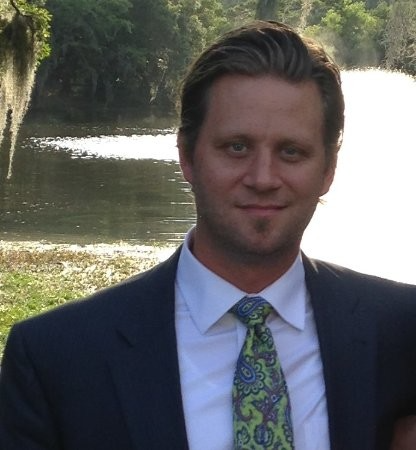XMNR alum Tony Deyerle lands dream job as solar farm developer
September 21, 2021

By Lindsay Key
Since he was in college, Executive Master of Natural Resources (XMNR) alum Tony Deyerle knew he wanted to work in the field of renewable energy. But after graduating with an undergraduate degree in finance and real estate from Virginia Commonwealth University, he pursued a career as a real estate acquisition specialist for Network Building + Consulting, helping wireless companies meet the demand for improved infrastructure in densely populated areas.
Although Tony enjoyed his career, he didn’t let go of his dream to move into the renewable energy industry one day. In 2019, the stars aligned when his employer approached him about opening up a new division for electric car charging stations. In Tony’s mind, that was the tipping point that pushed him to pursue the XMNR in 2018.
Most executive graduate programs come with a cost, and Tony was apprehensive at first about jumping in. But “the program has paid for itself ten times over,” he remarked. “The friends and lasting professional connections I made through my cohort itself are worth the price of tuition, not to mention the fantastic faculty and engaging coursework.”
On top of that, the XMNR program helped Tony eventually land his dream job in renewable energy, working as a project developer for Sun Tribe Development, a clean energy company headquartered in Charlottesville, VA. Every student in the XMNR program has an opportunity to work with a career coach, and Tony’s coach pointed him in the direction of a contact with professional connections at Sun Tribe.
In his role, Tony oversees the acquisition of new land for solar farms, working with private and public landowners to envision how their land could be transformed into a renewable energy haven. Sometimes, a landowner has inherited property through a trust and is looking for a socially responsible purpose for it. Other times, the property is owned by a city, county, or state, but local legislators determine that a solar farm could be an economic boon to the community. And yet other times, the property is a brownfield—a former industrial or commercial site so environmentally contaminated that it is deemed inadequate for farm or residential use.
“There have been quite a few instances where we’ve determined that an abandoned coal mine or an old landfill would be a good spot for a solar farm,” said Tony. “We try to utilize land that can’t be used for other things.”
Typically, developing a solar farm takes three to five years, according to Tony. Once a willing landowner is found, Sun Tribe then works with local municipalities to make sure that the land is zoned correctly for a solar farm. Sun Tribe representatives attend multiple public hearings to spread awareness about the value of solar farms in communities. Simultaneously, they meet with an environmental firm to conduct sediment and erosion studies to ensure the site is ripe for construction and that no native wildlife will be harmed in the creation of the farm. Then, various cultural studies must be conducted to be sure that the site does not contain any historic or cultural landmarks that would be damaged in the creation of the farm.
Having started his position at Sun Tribe Development in October 2020, Tony is already actively participating in the development of three solar farms—one in Alabama and two in Virginia—with three more potential farms in the pipeline.
“Solar is a huge market in Virginia,” said Tony. “The competition is just insane, and I’m so thankful for that. Renewable energy is finally getting its day in court. It used to be so expensive to run a solar farm, but now the battery technology is there to make it an extremely profitable industry.”
In addition to helping him find his dream position, Tony said the XMNR helped him develop as a leader, teaching him the art of active listening as a core communication tactic. His cohort’s Global Study Experience in India increased his cultural competency and understanding of diverse perspectives.
“The year goes by so fast,” said Tony. “You blink your eyes and it’s over. But afterwards, when you’re back in your professional setting, you realize all that you picked up along the way.”

Executive MNR alum Tony Deyerle talks about how the Virginia Tech graduate program helped him land his dream job in renewable energy, working as a project developer for Sun Tribe Development, a clean energy company headquartered in Charlottesville, VA.


